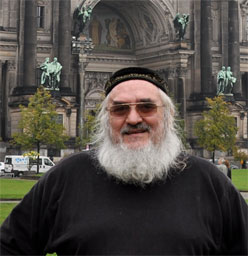

Albi - Urs-Albert Wethli
Albis Work
face-music.ch
-- CD-Program Face Music --
Face Music
(FM Suisse) – the idea was born out of the necessity to build bridges,
for a better understanding of other cultures and minorities.
- Foundation of the association
“Musik-Zirkus” 1978
The
story began with some concerts in the canton of Thurgau in Eastern
Switzerland, where “Albi” has chosen to establish his residence. It was
there that the idea was realised to welcome artists in this region and
revive the local scene; to create inspiration by encounters with
artists from other regions and cultures; to establish a platform for
young people, enriching their prevailing music taste; to foster
inter-action with cultures and, hence, establish a better understanding
thereof. Quality, however, has always played a central role, leading
away from the cult with stars in huge concert halls, encouraging
finding pleasure in listening to music in daily life in the
countryside; gathering experience with sessions creating inter-action
between artists and the audience. Music is supposed to retain its
effect on other people, creating atmosphere; it is also ought to
communicate a message. Music, however, may also be simply entertaining,
or be fun; it should nevertheless never become “a consumer good for the
masses”.
The
first concerts were being hosted in smaller towns and villages in the
region of Lake Constance, examples thereof being Frauenfeld,
Kreuzlingen, Romanshorn, Sommeri, Wängi, and Weinfelden. International
and national bands were invited to perform together with regional
artists. The rather diverse music spectrum was covered by different
types and styles of music. The concerts were hosted in different forms
and at various places, such as village centres, halls, or open air in
summer. Open airs with blues, jazz, rock, theatre and traditional music
were performed on the same stage. A small market place with regional or
local handicraft and catering was used to revive town life.
Furthermore, also regional competitions with the participation of the
audience were offered in order to stimulate artists to perform in a
public competition – as this has been the case since the beginning of
mankind, on the occasion of regional festivities, including encounters
with tradition and customs and invited guests, this also constituting
enrichment for the regions. Such competitions have been promoting a
supra-regional network and, certainly, also development and creativity.
The
programme of the “Musik-Zirkus” included from 1978 to 1981 as follows:
- National artists:
Adversus,
Africana All Stars, Allegretto Quintett, Appenzeller Streichmusik
Bänziger, Asphalt Blues Company, Belvedere, Bepejama, Beat Brechtbühl's
Elephant, Bucks, Cameleon, Circus, Clips, Colletivo Teatrale, Dragon
Fly, Exit, Frauenfelder Rock-Oper "Paul", Galgevögel, Gallis Erbe,
Georges Tempest, Godot, Grauzonen-Express, Heinz Lieb Quartett, Hoity
Toity, Infra Steff's Red Devil Band, Jazzforum Big Band Aarau, Jeff's
Rhein Rockers, Trio KKK, Kifaru, Kjol, Lazy Poker Blues Band, Mano,
Meridies, Off & Out, OM, Plamp, Markus Portenier Trio, Sic,
Shaggy Dog Revival Band, Shivananda, Suspended Four, Tabasco,
Theatergruppe Theogovia, TNT, Töbi Tobler, Uhuru Quintett, VAL 5, Yours
Truly.
- International artists:
Baba
Yaga (D), Crash (PL), Dave Burrell (USA), Déjà Vu (D), Changes (D),
Imre Köszegi Group (H), Laboratorium (PL), Lumpenpack (D), Neighbours
(A), Pekka Pohjola Group (FIN), Piirpauke (FIN), Rotglut (D), SBB (PL),
Slawomir Kulpowicz Trio (PL), Smith-Kowald-Sommer (USA-D), Timeless
(A), Vargavinter (S).
The
organization was additionally supported by the active help of high
school students, volunteers, regional musicians with media presence,
and, of course, regional and supra-regional sponsors.
“Albi”
has never lost contact with his old environment, and he is still
participating in music performance series with "Musig am Määntig" at
the University of Zurich, the “Fabrik-Jazz" in the Roten Fabrik in
Zurich, and "Musig bi dä Lüüt" in Thalwil, where he now has his
residence. Albi was the co-founder of the MKS, "MusikerInnen
Kooperative Schweiz" (or "Swiss Musicians 'Cooperative"), which he has
supported by way of the experience he has acquired and his network of
international contacts.
- Foundation of the label "Face
Music Switzerland – FM Suisse" 1987
"Albi"
has remained true to his work with music and cultures up to the present
day, and he has always taken seriously his attempts to build bridges to
a development of bands having no infrastructure of their own and,
hence, no interest groups supporting them, to assist them in their
development through the experiences he has made. Concerts with artists
from other cultures have included variety and diversity in the regional
scene, and these have been warmly welcomed by the audiences. The tours
and concerts have met a great demand therefore, this including also
music recordings. This constitutes one of the reasons for the
foundation of the label "Face Music Schweiz" – „FM Suisse“– this label
ought to offer the opportunity to realize such projects. The Swiss
music label still offers a varied international programme with original
music having roots in rather different cultures.
We
also started with jazz-rock or Fusion.
A
first attempt at linking these styles was made in the mid-1960s by rock
musicians from England, headed by "Colosseum", with the musicians Jon
Hiseman and Dick Heckstall-Smith, and "Cream", with Jack Bruce, Ginger
Baker, and the guitarist John McLaughlin. On the west coast of America
it was Frank Zappa with his "Mothers of Invention" and other American
groups such as "Blood Sweat and Tears" and "Chicago". The era of Fusion
was directly influenced by the jazz side, first by the "Miles Davis
Group", which included Herbie Hancock, the "Mahavishnu Orchestra", Joe
Zawinuls' "Weather Report", Chick Coreas' "Return to Forever", or Tony
Williams' "Lifetime".
In
Europe it is worth recalling the "United Jazz & Rock Ensemble",
Klaus Doldinger's "Passport", and the French artist Jean-Luc Ponty, and
also the Polish influences should certainly not be forgotten: last but
not least, to be mentioned are Zbigniew Seifert, Namyslowski, and the
Cracow Collective "Laboratorium".
Nothing
has changed so far. The music business still is on the search for the
latest trend and up-to-date one-hit-wonders, something to attract the
masses and easily market products in an economically pleasing way. For
this reason, artists are forced to adapt to the manipulated taste of
the masses in order to become popular. We all strive to gain our
living, this is, we have to earn money to survive and to live in our
present society. Individual ideas and experiences will not be accepted
by the market, being pushed further into the background. It is all
about so-called “nice products”! Only a few are successful to attract
bigger audiences and survive and prevail. The majority will never leave
the rehearsal rooms or pass regional borders. Increasing commercial
demand and (ab)use limit the habitat of art itself. Marketing is
invading the communication of art. Every active artist is in search of
opportunities to process forms of expression with the audience. This is
intended to contribute to an improvement of the existing quality of
living in our society. In this regard, however, we are suppressed and
limited by a prevailing opinion, only commercially successful
performances will be accepted by the society, will succeed in finding
sponsoring. This is a type of feudal system, a platform in grand style.
Public subsidies are steadily being cut, which is why organizations
have to change their strategies, have to cancel their projects due to a
“lacking of funds”. The ever growing privatization of sponsoring has
developed into a situation, in which financial support is only being
granted if the project is considered an intellectual hobby, or if a
project is of interest for the great masses and is warmly welcomed by
the public, this is, if it becomes popular. Funds are only open to art,
if such an investment will be financially rewarding, if it will raise
prestige within the community.
We
still hope that we, with our direct access to our repertory of
productions offered to an interested and open-minded public, are still
in the position to motivate and stimulate people to listen to these
artists, to have pleasure in discovering something new, to show respect
to the traditions of other cultures. We look for and are in need of a
broad basis of music connoisseurs, who are willing to indulge in our
carefully selected productions, and are willing to show their support.
We also hope to continue to participate, in co-operation with our
musicians, in a colourful and communicative music world. Tradition has
been preserved in a closed culture, but now it is in search of bridges
leading to a new and open-minded audience.
Publications
are based on existing field research records, which have been revived
or which are performed by the doyens of this type of music. Such
documented recordings constitute the basis for projects leading to
concerts or workshops, being then offered to a newer generation. This
is a form of contribution to the preservation of customs and traditions
on the basis of their roots, to offer insight to other peoples and
cultures. Actually, such publications should be included in
ethnological archives or in music schools, should be promoted and
supported. But, also here, funds are being cut, departments in charge
are being closed. The music industry itself is interested in the
promotion of other aspects.
So
far, this label has published music from Georgia, Armenia, the Ukraine,
Egypt, Mongolia, Togo (Western Africa), Uganda (Eastern Africa), Brazil
(Southern Brazil), Argentina, and Russia.
The
collection comprises Slaw and Cossack songs, collected in Siberia,
throat singing songs from Turk tribes and Mongols, songs of the Altai
tribes, and so on. It furthermore includes a great amount of
information on these peoples, their forms of living, and their rituals
and rites; this information is attached in the booklet or may be found
on our homepage; see, for example, history of the steppe nomads, ritual
mask dance of the Buddhists (Tsam), handicrafts of various cultures,
tengerism or shamanism (religions of the indigenous peoples), art of
the steppe peoples, of the Mongols and in Buddhism, migration of the
Bantu tribes, archaeological excavations in the European, Eurasian and
Asian areas of the steppe nomads.
Up-to-date
information in the web:
Thalwil,
end of March 2012 – translated by Hermelinde Steiner